Background
Timothy Minchin was born on February 4, 1969, in Cheltenham, Gloucestershire, United Kingdom to the family of a vicar Anthony John Minchin and Christine Elizabeth Clifford.

University of St. Andrews, Saint Andrews, Fife, United Kingdom
Timothy Minchin studied at the University of St. Andrews and graduated with a Master of Arts degree in 1991.
Cambridge University, Cambridge, Cambridgeshire, United Kingdom
Timothy Minchin became a Doctor of Philosophy at Cambridge University in 1995.
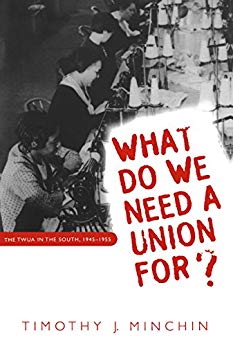
(The rise in standards of living throughout the United Sta...)
The rise in standards of living throughout the United States in the wake of World War II brought significant changes to the lives of southern textile workers. Mill workers' wages rose, their purchasing power grew, and their economic expectations increased - with little help from the unions. Timothy Minchin argues that the reasons behind the failure of textile unions in the postwar South lie not in stereotypical assumptions of mill workers' passivity or anti-union hostility but in these large-scale social changes. Minchin addresses the challenges faced by the TWUA - competition from nonunion mills that matched or exceeded union wages, charges of racism and radicalism within the union, and conflict between its northern and southern branches - and focuses especially on the devastating general strike of 1951. Drawing extensively on oral histories and archival records, he presents a close look at southern textile communities within the context of the larger history of southern labor, linking events in the textile industry to the broader social and economic impact of World War II on American society.
https://www.amazon.com/gp/product/B005F5OK1U/?tag=2022091-20
1997
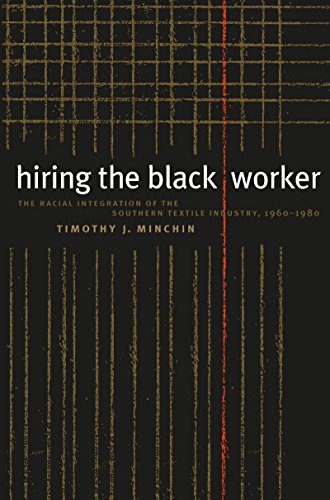
(In the 1960s and 1970s, the textile industry's workforce ...)
In the 1960s and 1970s, the textile industry's workforce underwent a dramatic transformation, as African Americans entered the South's largest industry in growing numbers. Only 3.3 percent of textile workers were black in 1960; by 1978, this number had risen to 25 percent. Using previously untapped legal records and oral history interviews, Timothy Minchin crafts a compelling account of the integration of the mills.
https://www.amazon.com/gp/product/B008HDOSGO/?tag=2022091-20
1999
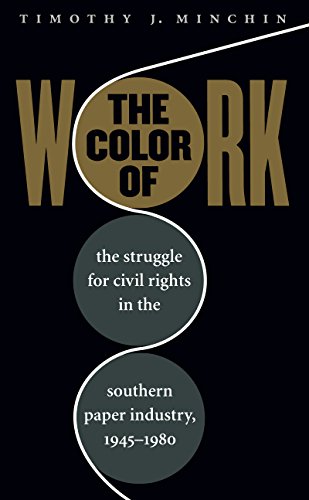
(Histories of the civil rights movement have generally ove...)
Histories of the civil rights movement have generally overlooked the battle to integrate the South's major industries. The paper industry, which has played an important role in the southern economy since the 1930s, has been particularly neglected. Using previously untapped legal records and oral history interviews, Timothy Minchin provides the first in-depth account of the struggle to integrate southern paper mills.
https://www.amazon.com/gp/product/B00440D1U8/?tag=2022091-20
2001
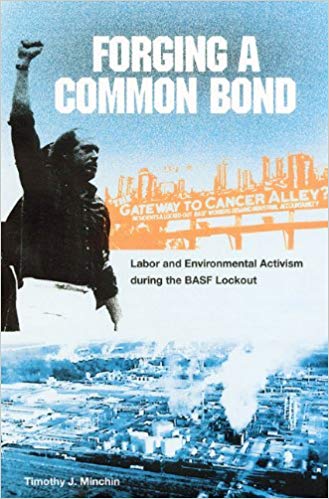
(Minchin's research challenges the prevailing notion that ...)
Minchin's research challenges the prevailing notion that unions and environmental groups have conflicting interests. He demonstrates how the workers' alliance with environmentalists led to a lasting transformation in the way that both groups view environmental issues, and he documents subsequent union involvement in a variety of environmental projects. Minchin also proves that the 1980s were not exclusively an era of defeat and decline for United States unions - that they could still win disputes, especially by reaching out to new allies.
https://www.amazon.com/gp/product/081302580X/?tag=2022091-20
2002
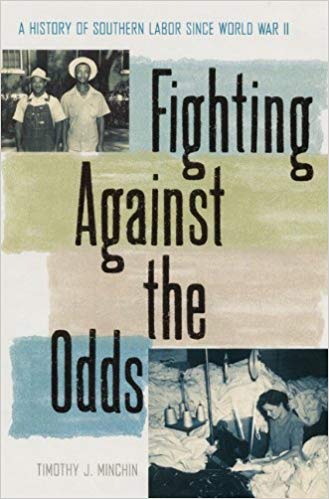
(Timothy Minchin brings the story of southern labor up to ...)
Timothy Minchin brings the story of southern labor up to date and places the workers' own experiences in the forefront of his account. He considers the central question of whether the modern South is still distinctive, arguing that the region's lower wages, lower rates of unionization, and legacy of racial segregation continue to set it apart. He stresses that southern workers have a rich history of labor activism, despite the fact that establishing lasting unionism in the region has been difficult.
https://www.amazon.com/gp/product/081302790X/?tag=2022091-20
2005
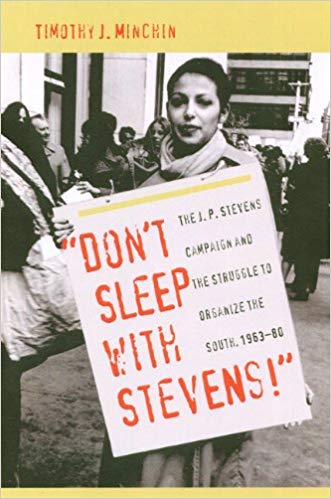
(In "Don't Sleep With Stevens!," Timothy Minchin explores ...)
In "Don't Sleep With Stevens!," Timothy Minchin explores a major union campaign to organize J. P. Stevens, a giant textile firm that employed over 40,000 southern workers. Between 1963 and 1980, textile unions targeted Stevens because they reasoned that if they could organize such a large employer, it would open up the South to organized labor. Stevens, however, vehemently resisted the organizing drive, repeatedly breaking labor laws in the process. The high-profile battle took on a symbolic importance, especially after the union initiated a boycott of the company's products. Launched in 1976, the boycott secured national press coverage and mobilized many supporters, including political leaders, civil rights activists, feminists, students, and church groups. The campaign also inspired the Oscar-winning film Norma Rae (1979). Feeling the pressure, in October 1980 managers finally agreed to a truce.
https://www.amazon.com/gp/product/0813028108/?tag=2022091-20
2005
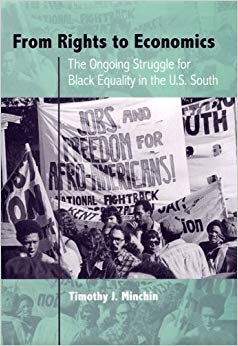
(Rich with the voices of black and white southern workers,...)
Rich with the voices of black and white southern workers, From Rights to Economics shows how ardently African Americans have had to continue fighting for economic parity in the decades since the civil rights legislation of the 1960s. Using oral histories and case studies that focus on black activism throughout the entire South, award-winning historian Timothy Minchin examines the work of grassroots groups--including the Southern Regional Council and the NAACP Legal Defense Fund - who struggled with the economic dimensions of the movement. While white workers and managers resisted integration, activists' efforts gradually secured a wider range of job opportunities for blacks. Minchin shows, however, that the decline of the manufacturing industry in the South has been especially difficult for the African American community, wiping out many good jobs just as blacks were gaining access to them.
https://www.amazon.com/gp/product/0813030927/?tag=2022091-20
2007
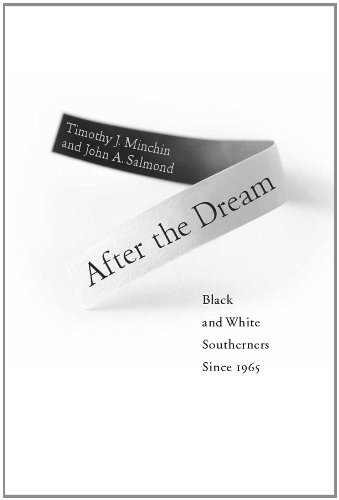
(Martin Luther King's 1965 address from Montgomery, Alabam...)
Martin Luther King's 1965 address from Montgomery, Alabama, the center of much racial conflict at the time and the location of the well-publicized bus boycott a decade earlier, is often considered by historians to be the culmination of the civil rights era in American history. In his momentous speech, King declared that segregation was "on its deathbed" and that the movement had already achieved significant milestones. Although the civil rights movement had won many battles in the struggle for racial equality by the mid-1960s, including legislation to guarantee black voting rights and to desegregate public accommodations, the fight to implement the new laws was just starting. In reality, King's speech in Montgomery represented a new beginning rather than a conclusion to the movement, a fact that King acknowledged in the address.
https://www.amazon.com/gp/product/B0078XFLPQ/?tag=2022091-20
2011
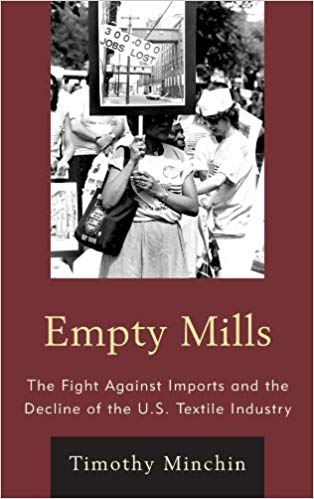
(With the economy struggling, there has been much discussi...)
With the economy struggling, there has been much discussion about the effects of deindustrialization on American manufacturing. While the steel and auto industries have taken up most of the spotlight, the textile and apparel industries have been profoundly affected. In Empty Mills, Timothy Minchin provides the first book length study of how both industries have suffered since WWII and the unwavering efforts of industry supporters to prevent that decline. In 1985, the textile industry accounted for one in eight manufacturing jobs, and unlike the steel and auto industries, more than fifty percent of the workforce was women or minorities. In the last four decades over two million jobs have been lost in the textile and apparel industries alone as more and more of the manufacturing moves overseas. Impeccably well researched, providing information on both the history and current trends, Empty Mills will be of importance to anyone interested in economics, labor, the social historical, as well as the economic significance of the decline of one of America’s biggest industries.
https://www.amazon.com/gp/product/B00F4389V0/?tag=2022091-20
2012
Timothy Minchin was born on February 4, 1969, in Cheltenham, Gloucestershire, United Kingdom to the family of a vicar Anthony John Minchin and Christine Elizabeth Clifford.
Timothy Minchin studied at the University of St. Andrews and graduated with a Master of Arts degree in 1991. He became a Doctor of Philosophy at Cambridge University in 1995.
Timothy Minchin is a British writer, historian, and educator based at La Trobe University in Victoria, Australia. As a scholar, Minchin focuses his attention on labor history in the United States, with an additional specialization on race-based issues in the United States labor relations and in the southern textile industry. He also conducts research on the history of the United States South, on race relations and civil rights, and on general twentieth-century United States history.
Minchin started his career as a Mellon Research Fellow at Cambridge University in 1995-1998. In 1998 he was appointed a Lecturer in History at the University of St. Andrews. Since 2004 he is associated with La Trobe University in Victoria, Australia where he started as a Senior Lecturer in History and was gradually growing to the position of a Professor of History being appointed on it in 2010.
Timothy Minchin is a contributor to periodicals and journals, including Australasian Journal of American Studies, Georgia Historical Quarterly, Journal of American Studies, North Carolina Historical Review, International Review of Social History, Oral History Review, Labor History, Florida Historical Quarterly, Journal of Policy History, and New England Quarterly.
(Martin Luther King's 1965 address from Montgomery, Alabam...)
2011(Rich with the voices of black and white southern workers,...)
2007(In the 1960s and 1970s, the textile industry's workforce ...)
1999(The rise in standards of living throughout the United Sta...)
1997(Timothy Minchin brings the story of southern labor up to ...)
2005(With the economy struggling, there has been much discussi...)
2012(Histories of the civil rights movement have generally ove...)
2001(Minchin's research challenges the prevailing notion that ...)
2002(In "Don't Sleep With Stevens!," Timothy Minchin explores ...)
2005
Timothy Minchin married Olga Bondareva on September 12, 1992.
